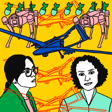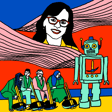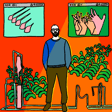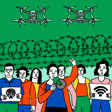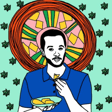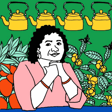Become a Creator today!Start creating today - Share your story with the world!
Start for free
00:00:00
00:00:01

1.4. The Future of the Israeli Left with Alon-Lee Green
On the fourth episode of Instant Coffee, LSE Middle East Centre's Jack McGinn talks to Alon-Lee Green about the future of the Israeli Left. Alon-Lee is National Director of Standing Together, a Jewish-Arab grassroots movement organising in Israel. You can find Standing Together on: Facebook: www.facebook.com/standingtogetherenglish/ Twitter: twitter.com/omdimbeyachad Instagram: www.instagram.com/standing.together.movement/ Youtube: www.youtube.com/channel/UCEE8M44MkYm6wqN8HN98jnA
Transcript
Introduction to 'Instant Coffee'
00:00:00
Speaker
Whether it should be a one-state solution, we are allowed to dream, yes, but why stop there? Why not go to dream of a socialist federation of the Middle East? The question is also how to get to your goal of ending misery, of ending the occupation, of ending violence and adding this circle of blood.
00:00:25
Speaker
This is Instant Coffee, a new podcast brought to you by the LSE Middle East Center and produced by me, Nadine Almanaspi and me, Ribal Sleiman Haydad.
Future of the Israeli Left
00:00:38
Speaker
On this episode, Jack McGinn talks to Alan Lee Green about the future of the Israeli left. Jack is Palestine's solidarity activist and communications coordinator at the LSE Middle East Center.
00:00:50
Speaker
Alon Lee is National Director of Standing Together, a Jewish-Arab grassroots movement in Israel. Over to you, Jack. Hi, Alon Lee, and thanks for joining us on the podcast.
00:01:01
Speaker
Hi, Jack. You're really nice to be here. Great. So I thought maybe we would just start the conversation about Israeli society and about where you see change coming. Obviously, that's what you're engaged in with Stanzi together and whether you think you can see change coming from
00:01:21
Speaker
within Israeli society, from outside, from combination? Maybe it's good to start with, you know, saying that there is an Israeli society. Kind of a news flash, but we are a society with, you know, our fears and hopes and dreams and worries and interests. And as any other society, we
00:01:47
Speaker
We are in a struggle of living in a country where we are taken care of by our government, where we are able to live without fear, and where we are able to live where our needs meet the actions of the government. And I think that the Israeli society's story in the past,
00:02:14
Speaker
two decades is of great opportunities next to big dangers.
Public Opinion and Government
00:02:19
Speaker
And it's this story where the government is doing whatever it can to deepen the Israeli occupation of the Palestinian occupied territories. And the government is doing whatever it can to put the interests of a very small minority group of
00:02:41
Speaker
a lead group of settlers and tycoons, very wealthy people in Israel in front of the interests of the vast Israeli society. And I think that if we look at that story from this angle of opportunities next to dangers, we will see that the majority of Israelis
00:03:05
Speaker
are holding the interest to change our government, to change the reality in Israel, and to work towards peace and equality and social justice. And we can see progress. We can see great points of hope where people are struggling together, shoulder to shoulder, standing together for those goals, for those changes in our reality.
00:03:28
Speaker
Yeah, I guess from an outsider's perspective, it does look like Israeli society has been drifting to the right for some time. I mean, I know there have been episodes like the 2011 tent protests, which I know you were a part of. However, since then, we've really seen, you know, right wing governments reelected Netanyahu becoming the longest serving prime minister in Israel's history and now moves towards
00:03:53
Speaker
annexation so where where do you see kind of like the hope coming from through that from Israeli society is it is it really true that Israeli society is interested in avoiding annexation and all that comes with it? Yeah definitely true actually all last polls opinion polls in the news showing a very clear answer on that
00:04:19
Speaker
70 plus percent of the Israeli society, right wing, left wing, center, Jews, Arabs, are saying that the first and most important thing the government should do right now is taking care on the economical, deep economical crisis that we are suffering now due to the coronavirus. Only 4% of the Israeli society or 4% even of the right wing
00:04:45
Speaker
are saying that the government should annex the parts of the West Bank. If you ask in the opinion polls, there's still a majority of Israelis supporting the end of the occupation and the two-state solution. And right now, around the annexation, more than 50% of Israelis are saying that annexation is bad for Israel as much as it's bad for Palestinians.
Netanyahu and Global Right-Wing Trends
00:05:11
Speaker
Yes, there is a very wide gap between
00:05:15
Speaker
the needs, the longings of Israeli society and the deeds of the Israeli government. I think it's not an only Israeli story. We are seeing a shift towards right-wing populism all around the world. Yes, Netanyahu was there already a decade, more than a decade ago, and yes, Netanyahu in many ways is a prototype of a right-wing populist leader.
00:05:42
Speaker
And he's been doing what Bolsonaro and Trump and your Boris Johnson is doing right now. He's been doing it for quite some years. And I think it's effective. It is effective to create a political equation where the government is pointing blame on people's trouble, not
00:06:02
Speaker
towards the ones that are on top, the ones that hold the political and economical power, but instead pointing the blame towards the one that are beneath you in the social ladder. Refugees, Muslims, Arabs, Jews in some countries, immigrants, and that's a very effective political tool that is received all around the world. And the question that should be asked is,
00:06:29
Speaker
What can we do to answer that? How can we create a left answer to this populist, right-wing populist that are in power? We haven't been very successful in doing that so far.
00:06:42
Speaker
Great, yeah, what to do is a good question. I think you could say that standing together stands in the tradition of the Israeli peace movement, the anti-occupation movement, which maybe reached its heights in the 90s with Rabin and peace now during the Oslo periods and massive demonstrations in Tel Aviv. However, the occupation has since entrenched
00:07:07
Speaker
and we now see moves towards annexation, what do you think sets aside movements like yours and this new generation of the Israeli left from those that came before?
00:07:20
Speaker
That's a really good question. But I want to start and say that we also have or had some victories along the way. Just 20 years ago, Israel withdraws from Lebanon after almost two full decades of occupying some land from Lebanon.
00:07:42
Speaker
being involved in an actual war. It was a very ongoing story between the Lebanese and Israeli people of story of casualties and story of violence and story of hatred.
Political Movements and Practical Issues
00:07:55
Speaker
And even though we don't have peace right now, it is a very big achievement of the Israeli peace movement to get the government leave Lebanon and withdraw back to the border.
00:08:07
Speaker
This now was involved in the movement of four mothers. I had a great achievement there. But what is very interesting and important to look at is the question of how are you relevant to people's life? I think it's a very important key question in politics. Can you be relevant if you're only talking about the interests of Palestinians, although you are operating
00:08:35
Speaker
and part of the Israeli society. Can you be relevant if you are only talking about the Israeli interests of ending the occupation or achieving peace if you are living in a bi-national society? And this key question is important to understand the difference also between standing together and other movements or organizations.
00:08:59
Speaker
in the peace movement in Israel. First of all, because we are not only a peace movement, we are a political social movement that is seeing the interconnections of the different struggles that are connected to the lives of people in Israel. And we are basing our politics on politics of interests, of shared interests.
00:09:20
Speaker
We understand that Palestinians living under the Israeli occupation for more than half a century, they have the interest to live in independence. They have the interest to live without fear and live without an armed army.
00:09:39
Speaker
controlling their lives and controlling their movements and doing whatever they want to their families and villages. And we also understand that Israelis hold this interest to live without fear and to live in peace and to live with
Community Unity for a Better Future
00:09:56
Speaker
security.
00:09:56
Speaker
and to live without missiles being shot over the head and these fears those those interests are something that we need to to base our politics on but not only that we need also to be relevant to the questions of what wages do you have when you go to work and you walk a fool
00:10:15
Speaker
a month and you still cannot get by and provide to your family. And the question of whether we have health services that are good enough or cheap enough or free enough to be providing for your good health and whether you are being able to live a respected life on your pension. So those questions are questions that were not being addressed by the Israeli peace movement.
00:10:42
Speaker
along the years. And we understand that you have to connect the struggles and you have to create a movement which is talking about a deep change in the Israeli society, in the Israeli reality. It is a change that also connects communities and brings Jews and Arabs together in the shared struggle for a better future for us.
Skepticism About Electoral Politics
00:11:06
Speaker
So in that case, you're tapping into, you know, resentment within Israeli society about just in regards to the government's foreign policy, but domestic policy, the now who government's being a fairly neoliberal institution. How do you see then the change coming? You're involved in electoralism, or I know that's obviously you'll have your roots in protest movements.
00:11:31
Speaker
I'm going to be frank and say that I don't believe change will come from parliament in the very near future. I can't see it happening. I don't think there are the forces there that will bring upon this change. And I think there are some amazing people in the Israeli parliament.
00:11:50
Speaker
I've worked myself for five years as a political advisor for a left MK in Israel, MK Dov Hanin, who is part of Chaddash, a Jewish Arab front, which is part of now the joint list. But ask yourself, or I don't know, it might shock some people, but you know how many Jews vote for the joint list?
00:12:13
Speaker
It was 4,000 voters in the first election of the joint list in 2015, and it's 20,000 voters, just half a seat out of the 15 seats of the joint list. And the way the political system in Israel is structured is just
00:12:30
Speaker
irrelevant and the Israeli left parties are not relevant anymore because one party is mainly Arab, the other party is mainly Jewish, Zionist. If you are looking to vote for a party that is also a socialist party and also a Jewish-Arab party, you can't find one. So they separate themselves into a very sectorial kinds of political parties.
00:12:59
Speaker
along the way people are just getting lost and people are feeling that their struggles are not being represented in parliament and and that you know we came to the point where the israeli left right now in after a year of three cycles of election is the smallest it has ever been in history yeah so i mean if that is the case then and electoralism seems to offer a dead end do you see
Binational State Solution Debate
00:13:25
Speaker
Do you see hope for, let's say, some of the more radical ideas about what could happen in Israel and Palestine in the future? So for example, you talked about Israel itself being a binational state currently. What about the one state solution? What about a binational state throughout all of historic Palestine with equal rights? Do you see any prospect for that? Is that desirable? I will start by saying that
00:13:54
Speaker
that great changes have happened in history. And we are talking today when women are allowed to vote and are having much more equality than they used to have, we have a long way to go and to struggle to achieve real equality. But if you look on the 20th Amendment in the history of the US, in the
00:14:20
Speaker
in the suffragist movement in the UK, in the US, you see that those changes did not come because prime minister or some minister or president of some country woke up one day and said, okay, today I feel I want to give equality for women. These changes happened because of movements, because of shipments that happened bottom up in society, that happened because people got involved and organized.
00:14:47
Speaker
If we will not come to understand that and to understand that we are in a huge junction of history where we need to decide whether we're going left or right, if we will not decide to organize and to create those movements that will bring those changes, it will not happen because some parliaments or governments will vote on this. To the question of what is the solution
00:15:13
Speaker
that is needed in Israel and Palestine in regards of the occupation and regards of equality. Because occupation is not the only bad thing that is going in international conflict. Arab, Palestinian citizens of Israel
00:15:29
Speaker
are suffering from inequality, from racism, from police brutality. And I think equality is the key element, is the key value to drive this change of the whole region. Whether it should be a one-state solution,
00:15:46
Speaker
We are allowed to dream, yes. But why stop there? Why not go to a dream of a socialist federation of the Middle East? That's also a nice dream. But the question is how to also get to your goal of ending
00:16:05
Speaker
and misery of ending the occupation of ending violence and adding this circle of blood. The answer is that a one state solution cannot be the first step to that. You have a very solid national
00:16:20
Speaker
majority in the occupied Palestinian territories that are for having independence. They want to live in a Palestinian independent state. In Israel, you have a very solid national majority that want to live in an Israeli independent state. Some of them will even say in a Jewish independent state, and I will have
00:16:42
Speaker
our work inside the Israeli society to fight inequality and fight racism and fight bigotry. But if you take this national majority on the one side and you take the other national majority on the other side and you put them under one state,
00:16:58
Speaker
I think it's a recipe for more bloodshed and for more violence.
Two-State Solution as a Path to Peace
00:17:02
Speaker
So the question needs to be asked is how to practically end this situation. And I think it's by achieving an independent Palestinian state alongside Israel. Two capitals in Jerusalem and the 67 borders, the demolition or evacuation of all settlements and an agreed
00:17:26
Speaker
agreed solution to the refugees problem. That is the only way right now and it's been known for many, many years. It's an achievable solution. On that issue of the refugees, that is a sticky topic. The Israeli right sees any return of significant number of Palestinian refugees as irrevocably changing the Jewish character of the state
00:17:50
Speaker
And I mean, don't they have a point? That is going to be a different state with a significant amount of Palestinians returning who were made refugees in 1948. What do you see is likely happening there as part of the solution that you mentioned?
00:18:10
Speaker
If the right wing in Israel is so afraid of some Palestinians returning to Israel, why do they push annexation so strongly? Annexating thousands or tens of thousands or hundreds of thousands, eventually maybe millions of Palestinians, it's a bit tougher situation for them in their eyes than bringing back a few thousand Palestinians as a part of
00:18:35
Speaker
of a peace solution and a solution for the refugee problem. I think that the whole issue is that the right wing in Israel is not having any answers. They are just about preserving the status quo and managing the conflict instead of thinking of solutions. They know that annexating parts of the West Bank will include annexating
00:19:00
Speaker
Palestinians. Do they want those Palestinians being living under Israeli law and having no right to vote and no civil rights? That's apartheid. And I'm sure it's not a situation that can be manageable anymore. That's a situation that will explode on the faces of Israelis and Palestinians.
Call for Peace and Equality
00:19:21
Speaker
So the answer is that you need to look on reality. You need also to look on the reality that also the Palestinian leadership
00:19:29
Speaker
is not looking, I think, to move tens of thousands of Palestinian families back to the cities and villages they used to live before 48. I think a lot of the solution will be symbolic, confiscating, bringing some people back, giving their respect and comfortable life to the Palestinian refugees camp that are situated in Palestine and Jordan and in Lebanon.
00:19:59
Speaker
And I think the answer should be always, always pushing to the opposite side of the government's way. We need to go to peace and ending the occupation instead of going to annexation. We need to go towards equality and respect instead of going to more racism and more apartheid.
00:20:19
Speaker
Well, Alonli, thanks so much.
Closing Remarks
00:20:21
Speaker
We're going to have to leave it there. But thanks for joining us on Instant Coffee. Thank you very much, Jack. Best of luck, which sounds like a difficult struggle in Israel. Thank you. Thank you very much. It was a pleasure. Thank you, Jack and Alonli, for taking the time to speak to us. And thank you for listening to Instant Coffee, your quick fix of everything Middle East.
00:20:48
Speaker
Join us every Friday for a new episode of Instant Coffee where we interview artists, activists, writers, journalists and more from the region. To find out more about Standing Together, follow the links in the podcast description. Also make sure to subscribe to our podcast to stay updated on our latest episodes. Don't forget to follow us on Twitter, Facebook and Instagram. Until next time,

